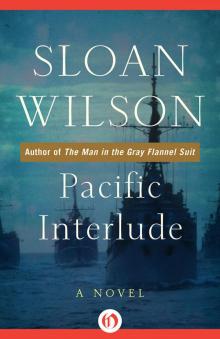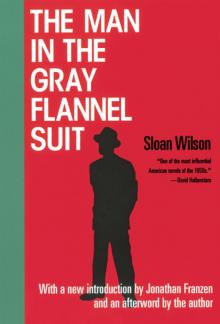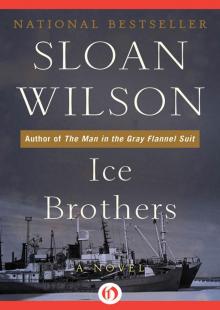- Home
- Sloan Wilson
A Summer Place Page 25
A Summer Place Read online
Page 25
The important thing is not to have a lot of preconceptions of what he will be like now, she thought. He is older, he will be going to college next year, and I must not stand here expecting to meet a young boy.
John was one of the first out of the airplane. He came down the stairway of the unloading platform a strong eighteen-year-old, but when Carla went running out to meet him his smile was boyish. Sylvia stood stock-still as he came toward her, and then his arm was around her, there was the scent of shaving lotion, and she had been kissed, briefly and politely, by her son. “It’s good to see you, Mother,” he said. “You’re looking awfully well.”
“So are you,” she thought she said, but her lips moved inaudibly, and she had to say it again: “So are you.”
How gracefully he walked! How courteous he was as he chatted with Ken, how affectionate with Carla! How at ease! With what polish he opened the car door for her, helping her in, and shutting the door firmly but without too loud a slam. And what implacable reserve there was beneath all those good manners, Sylvia thought; how secret were the eyes above those smiling lips.
“Isn’t Molly here?” he asked when they got in the car, almost succeeding in sounding casual.
“She walked down to the inlet, and I guess she misjudged the time,” Ken said. “She’ll probably be home when we get there.”
“You’ve got quite a surprise in store for you,” Sylvia said, trying to sound gay. “Molly has become quite something to see.”
John made no reply, and for the first time Sylvia noticed that his face was pale.
Molly was not in the living room and not in her room when they got home; she was nowhere to be seen, and the hurt in John’s eyes was more than he could conceal. They sat down on the terrace overlooking the sea, and his eyes kept traveling up and down the beach, but she was nowhere. Sylvia tried to make polite conversation with him while his eyes kept searching the sand. I have forgotten the silent, secret ways of youth, Sylvia thought; of course she didn’t want to go to the airport, she wanted to meet him alone. Smiling, she said to John, “I think I’ll take a little rest. Why don’t you take a walk on the beach?”
“Can I go?” Carla asked.
“You stay with me,” Sylvia replied. “Ken, you promised you’d help Carla fix her radio.”
“Sure,” Ken said, rather bewilderedly. “Now?”
“Please, Daddy,” Carla said, and they went upstairs together.
Sylvia went inside and stood at the window watching John go walking down the beach, a tall young man in a brown gabardine suit, leaning forward to face the wind. Putting her hand up to shield her eyes from the sun, she watched him out of sight.
He saw a girl from a distance, a small person in a blue bathing suit sitting on a yellow beach coat on the sand, high on the dunes, with her back toward him, facing the inlet. Probably it was she, he thought, forcing himself not to run. Even when he was close to her he could not be sure. Then his shadow, preceding him on the sand, fell across her, and she glanced up: the heart-shaped face, the big eyes—Molly. They must have said something, but no words remained in his memory afterward, only the way she looked, her dark hair, the thin gold chain around her neck, the old-fashioned locket given her by her mother resting just at the beginning of the swell of her breasts, her incredible grace: Molly, at seventeen.
He sat down beside her, apparently without words, or at least without words which meant enough to be remembered. He glanced down at her ankles, slim and graceful, the marvelous tendons of her foot, taut beneath the skin.
For about five minutes they sat together there, staring out to sea where the breakers curled over, crashing in upon themselves. They glanced secretly at each other, but looked away quickly again. A family of picnickers, a middle-aged couple and their children, came and spread out a tablecloth on the sand a few hundred feet away, and shouted hoarsely at their children, giving orders concerning the unpacking of baskets, the opening of Thermos jugs, and the gathering of firewood. Impatiently John and Molly stood up, and started down the beach, walking in the soft sand, oddly matched, with her in her bathing suit, and him in his brown gabardine suit. Their hands, swinging as they walked, touched, and he took hers. “It’s wonderful to see you again,” he said.
Part Four
Speak Now
Chapter Twenty-Six
“JOHNNY’S GOT A GIRL FRIEND!” Carla, who was then twelve years old, said four days later. “Yes,” John said. “I have.”
He was in his bathing trunks now with a towel thrown casually over his shoulders to hide a small splotch which embarrassed him unbearably.
“I can see why you’re on the boxing team,” Ken said. “You’ve got quite a set of shoulders there.”
“Actually, I don’t like boxing very much,” John replied.
He left them as soon as he could and ran swiftly to the beach, where Molly was awaiting him. It embarrassed them less to leave the house individually, and to meet in private. Wearing her blue bathing suit, she was sitting just above the reach of the tide. “Hello!” he called exuberantly as he ran. “Sorry I’m late!”
He was all of three minutes late. She stood up, smiling, with the wind blowing her hair across her face. “I haven’t been waiting long,” she said.
They started walking down the beach together, their hands automatically locking, the wind at their backs. Near the inlet at the end of the beach they paused. Three shrimp boats were putting out to sea, fighting the breakers on the bar and the rush of the incoming tide. A flock of gulls hovered like a great wheel turning over them. Farther up the inlet was a hollow created in the sand by the surf during the last hurricane. Semi-surrounded by high banks which were covered with tall grass and stunted palmetto trees, it offered at least a measure of privacy. John wanted to take Molly there, but the fear mounted in him that she would refuse, that in all probability she was willing to hold his hand simply as an act of friendship, far different in its implications from accompanying him to a lonely spot. If he did ask her to go there with him, he thought, or if he simply headed in that direction, she might refuse, saying, perhaps, “Why do you want to go there, Johnny?” She might even feel indignant, shocked, angry, disgusted, jerking her hand from his forever because he had misinterpreted a comradely gesture, and then, of course, he would be left standing there on the beach stammering apologies, and the sky would fall, all dreams would shatter and come crashing down like broken glass around his feet. Torn by his desire to be alone with her, away from the eyes of the swimmers and picnickers and gatherers of shells, and by the fear of ruining what was already a kind of perfection, he stood tongue-tied. Then, with the feeling that he was taking an immense gamble, risking everything on one sentence, he said, “Let’s go in there where we can sit sheltered from the wind.”
“All right,” she said.
They walked into an amphitheater of broken dunes. Beneath their feet the sand, shading from tan to gray to white, was still stippled by the action of the waves. When they found themselves shielded from passers-by, they sat down awkwardly, with their backs against the steep slope of the dune, their legs stretched straight out in front of them, their hands still clasped, their faces tense, almost agonized. He wanted to put his arm around her waist, to pull her toward him; he wanted to touch her shoulder, but again the fear rose within him, redoubled. Maybe, indeed probably, she had come there with him just to get out of the wind. “Johnny!” she might say if he touched her, “Johnny Hunter, you stop that! Why, the idea! Johnny, you should be ashamed of yourself!” She might slap him, she might go screaming down the beach calling for help, she might tell her father, the police; and worst of all, he might find that he inspired in her only disgust, that she didn’t love him, that no woman could ever love him at all. If he tried to kiss her she might recoil in horror, as though touched by the snout of a pig, and then he would know, as he had always suspected, that there was something repugnant about him, and that he was condemned to loneliness. He would have to walk back up
the beach then, knowing that she would soon abandon him for someone else; that she had been kind, but that no one could in the last analysis be kind enough to overlook the fact that he was too repellent to be loved.
After sitting frozen by these thoughts for a minute, John moved toward her a little, cautiously enough to make it look like an accident if she recoiled, ready to pull back and say with elaborate casualness, “Sorry!” His muscles were so tight that his arms ached. She let go of his hand suddenly, perhaps in alarm. He put his arm back in a torturous, cramped position, not touching her, but then she leaned toward him, and he let his arm down on her shoulders. Thus the incredible came to pass, he played Russian roulette and won, or at least she allowed him to place his arm around her shoulders, and did not scream or run.
They sat in a very cramped position, their bodies rigid, he leaning forward with his arm around her warm shoulders, she half turned to rest against him, and he was afraid to speak, afraid to move a quarter of an inch for fear she would pull away from him. A strand of her hair blew across his lips; he bent his head down; the fragrance of her hair and skin seemed to grow more and more intense until he took her by both shoulders and turned her to him, thinking now she will run, now I have betrayed myself, but I cannot help it, and he kissed her on the lips, finding them soft, inquiring, maybe responding, maybe not. Terrified that she would pull away, he kissed her again, and he was not sure of her consent until he felt her place her hand on the back of his head, caressing him softly. Then a shudder went through him, and feeling that the greatest of all imaginable crises had passed, he looked up and found her smiling at him. In slow motion he reached out his hand and touched her gently on the cheek, and the old words sounded newly invented.
“I love you,” they both said.
He stretched out on the sand beside her. “You are,” he said, saying something he had been aching to say for the past four years, something he had been afraid to say, “you are more beautiful than I can believe.”
“I’m glad,” she said. “It’s nice to know you like the way I look.” There was a pause, and then she added, “Johnny, you aren’t fooling me, are you?”
“I love you so much you make me tremble,” he said. He held his hand out to her, and it was true, at that moment he was trembling, as though just rescued from the face of a cliff. She caught his hand and held it tightly against her cheek. “I was scared to death you didn’t really like me,” she said.
“Me too. I was afraid that if I tried to kiss you, you’d run.”
She laughed and he kissed her again, burying his face in her neck, tasting the saltiness of her skin. Then the laughter stopped, and there was the incredible softness and warmth, beauty beyond old dreams, so long forbidden.
“No, Johnny,” she finally said, pulling away from him.
“Are you angry?” he asked in panic.
“No, but I am afraid.”
“I want to marry you,” he said.
“We can’t. Not for years.”
“We could run away together,” he said.
“It would be silly, Johnny. You’ve got to go to college, and the army, and all the rest.”
“That will be six or seven years!” he said in horror.
“We can still see each other. Often.”
“But we have to go back to school in a week,” he said, astonished to find that this prospect remained even on these days of wonder.
“Where are you going to be next summer?” she asked.
“Pine Island. Could you visit us there?”
“I’m afraid Mother is going to keep me in Buffalo again,” she said miserably.
“Maybe we could get together in the fall,” he said. “I start at Harvard in September and girls often come for weekends.”
“Mother would never let me.”
The thought of the lonesome months ahead sobered them. They kissed more deeply than before, and he found it difficult to stop. “I don’t want to scare you,” he groaned. “I’ll take you home now if you want.”
She said nothing.
“Oh, Molly!” he said, and she did not pull away from his kiss.
For Molly there was fear, counterbalanced by the knowledge that the word “no” struck him like a stone in the face. There was the vision of his stalking away as so many boys had after dancing with her, his need unmet, her loneliness remaining. There were the kisses, the kisses… There was the moment of panic, the pain, in which a thousand hideous voices seemed to scream. There were the fears upon fears mounting and echoing against each other; there was the feeling of being imprisoned, of being unable to escape; there was the vision of her father crying. She seemed to be in a circle of mocking faces chanting shame! The thin, horrified scream of her mother ululated constantly in the back of her mind. There was the vision of her dead grandmother shaking a finger at her, telling her that monstrous things would happen if this were not forbidden. There was the incongruous stink of sweat, the sharp hot breaths, the animal sounds, the sudden image of a lamb being eaten by a lion—terror. At one time she tried to pull away from him, but he held her in a grip of iron. And then the bad part was over, and she found herself not with a beast of prey, but a man who worshiped her. His face was dumb with adoration, he was suddenly as gentle as a father with a child, and she knew finally that he belonged to her, that she had paid a great price, but that he was hers, and that she could not deny him when he begged forgiveness.
There was also joy. Since childhood she had thought of her body as something that had to be hidden, not only because of the unimaginable things, the wickedness, the sin, but also because she thought clothes were a necessary deception to hide some mysterious, fundamental ugliness of flesh. But on that day Molly found that in the eyes of one person at least she was, astonishingly enough, perfect; that she had nothing to hide; and that she could cause delight. It was an incredible luxury to stretch proudly there on the sand before him, bearing him gifts in the sun. There was the absence of all defenses, the easy communication between them, the fringe benefits of love.
Afterward there was the talking, the first time that either of them had ever talked to anyone, really, which is to say, the first time they had ever talked about anything which mattered. He told Molly all about Bill Norris, about how it had been to wake up at night and see that empty cot, perfectly made up, in that lonely room. He went on, the words rushing out in an orgy of truth, telling how the boys had jerked the covers off Bill, how Bill had lived for two years in the midst of cruelty and jeers, how the headmaster had covered up, how even he himself had ended by finding it impossible to tell Bill’s mother what had happened to her son. He told her also about the lonely summer he had spent at camp. She in turn told him in detail about her troubles at school, about why she had had to stop meeting him in New York, and about Margaret’s death. The fact that it is occasionally possible to talk about things next to the heart was an extraordinary discovery. It was as though they had always been alone in a desert world bereft of people, and for the first time met a human being; it was as though they had been deaf and dumb from birth and just found the power of speech; it was astonishing, this discovery that conversation can go beyond ordinary communication, that language when combined with love can conquer the separateness of people. He remembered the letters they had written each other, the funny mincing phrases, the sense that there was nothing to write about, except in poems or songs, and he said, “Why haven’t we ever been able to talk before?”
“Because we were afraid,” she said, stretching like a cat in the sun, fragile and delicate.
After about an hour they got dressed and started toward the house, walking slowly along the beach, pausing often, John still talking rapidly, gesticulating with his arms, laughing, picking her up in a torrent of words, explaining his whole life. She listened gravely. He told her about his father, about the day of his mother’s departure and the night, and was understood.
As they approached their house John did not feel oppressed by
the necessity to keep a secret. There was not the slightest temptation to tell anyone, neither to boast nor to confess. He walked into the living room of his mother’s home without seeing the people around him. When Molly went upstairs to her room, Sylvia started asking John questions about his school, and more to avoid an irritating interruption of his thoughts than anything else, he sat down at the piano and played his mother every song he knew, saving only the one he had written himself. Sylvia was astonished to find he could play so well.
But for Molly it was different. When she left John and started climbing the stairs to her room, she experienced a sudden dizziness so strong that she almost fell. At the head of the stairs Ken, who had heard her footsteps, emerged from his bedroom smiling, and said, “Hi, baby. Did you find some good shells?”
“No,” she said, her voice tight, tears almost coming, and hurried to her room as fast as she could without running. Totally confused, Ken stood mutely looking after her, wondering what he had done wrong.
That night Molly sat across from John at the middle of a long table with her father at one end and Sylvia at the other while an aged Negress served a festive dinner. Molly had a terrifying compulsion then to speak out, to tell the truth. “Dad,” she would say, and her father would glance up, his big alert face looking tired, as it had lately. “Dad,” she would say, “Johnny took me out in the dunes today, and I think I may be going to have a baby.” She imagined her father turning on John then in a rage.
The waitress took away a dish of pea soup, one of the favorite dishes which Molly had barely touched, and replaced it with a platter of rare roast beef, the very smell of which nauseated Molly. She glanced away from it, and she had another vision then, a horrifying one, of herself saying, “Dad, do you know what I did today?” and following that question with every obscenity she had ever seen chalked on lavatory walls, the short hideous words spewing from her mouth like vomit. Then her father would arise and smite her, perhaps kill her, she imagined.

 A Summer Place
A Summer Place Pacific Interlude
Pacific Interlude Man in the Gray Flannel Suit
Man in the Gray Flannel Suit Ice Brothers
Ice Brothers